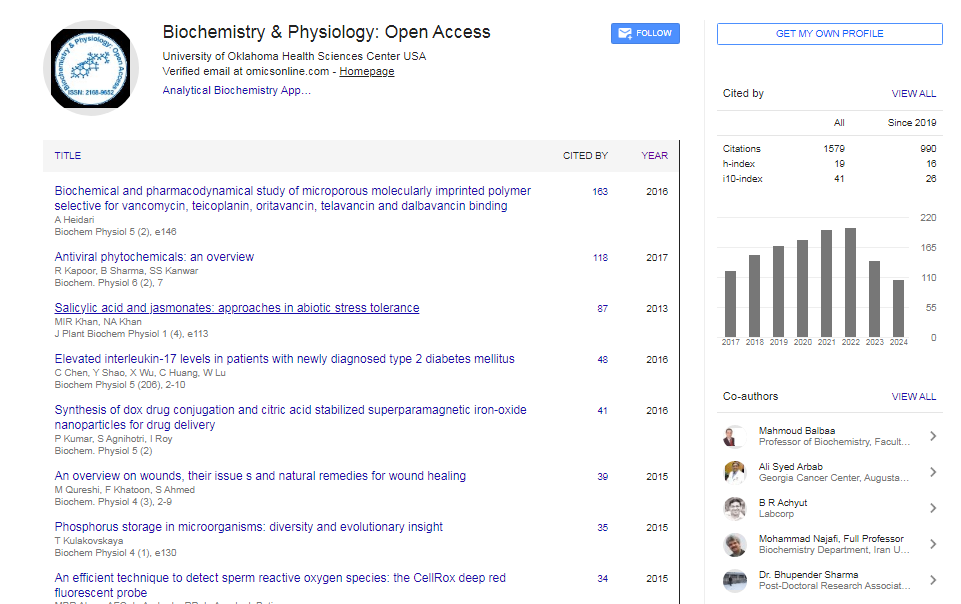Our Group organises 3000+ Global Conferenceseries Events every year across USA, Europe & Asia with support from 1000 more scientific Societies and Publishes 700+ Open Access Journals which contains over 50000 eminent personalities, reputed scientists as editorial board members.
Open Access Journals gaining more Readers and Citations
700 Journals and 15,000,000 Readers Each Journal is getting 25,000+ Readers
Google Scholar citation report
Citations : 1579
Biochemistry & Physiology: Open Access received 1579 citations as per Google Scholar report
Indexed In
- CAS Source Index (CASSI)
- Index Copernicus
- Google Scholar
- Sherpa Romeo
- Open J Gate
- Genamics JournalSeek
- Academic Keys
- JournalTOCs
- Ulrich's Periodicals Directory
- Electronic Journals Library
- RefSeek
- Directory of Research Journal Indexing (DRJI)
- Hamdard University
- EBSCO A-Z
- OCLC- WorldCat
- Scholarsteer
- SWB online catalog
- Virtual Library of Biology (vifabio)
- Publons
- Euro Pub
- ICMJE
Useful Links
Recommended Journals
Related Subjects
Share This Page
Gregory Lee

Gregory Lee
UBC Center for Reproductive Health
University of British Columbia
Vancouver, Canada
Biography
Upon completion of his Ph D degree in Biophysical Chemistry at California Institute of Technology in 1972, he joined UCSD as a NIH Postdoctoral Fellow to carry out pioneer work on general ligand affinity chromatography. In 1976, he studied enzymology and biochemical genetic at the National Institute of Health and in 1981, he was appointed as a faculty member and director of the Andrology Laboratory at the University of British Columbia. During the last two decades, he has created numerous monoclonal antibodies for diagnostic and therapeutic applications in human health care, including RP215 and GHR106 for potential use as anti-cancer drugs.
Research Interest
Research and Development of Antibody-Based Anti-Cancer Drugs
- RP215 monoclonal antibody was shown to recognize specifically a carbohydrate-associated epitope located on the variable regions of cancer cell expressed immunoglobulins, designated in general as CA215.
- Structural elucidation of carbohydrate-associated epitope in CA215 which is recognized by RP215 monoclonal antibody (Mab)
- Humanizations of RP215 Mab for preclinical studies
- Generations of Rat anti-idiotype Mabs as candidates for the development of anti-cancer vaccines in humans
- Establishment of an Anti-GnRH receptor Mab, GHR106, as a substitute of short-acting GnRH analogs for antibody-based anti-cancer drugs, as well as preclinical studies.
- Elucidation of mechanisms of action for RP215 and GHR106 as antibody-based anti-cancer drugs.
- Elucidation of a carbohydrate-associated epitope recognized by RP215 monoclonal antibody.

 Spanish
Spanish  Chinese
Chinese  Russian
Russian  German
German  French
French  Japanese
Japanese  Portuguese
Portuguese  Hindi
Hindi 
